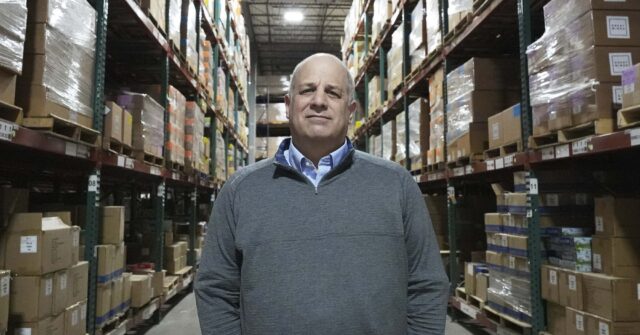In a case that’s drawing headlines but missing the bigger picture, Learning Resources — a small, family-owned toy company based in Illinois — has launched a lawsuit against President Donald Trump and several members of his administration. The company is challenging the tariffs imposed under Trump’s historic push to rebalance America’s trade policy and protect American workers from decades of globalist exploitation.
The lawsuit, Learning Resources v. Trump, filed in the U.S. District Court for the District of Columbia, argues that the former president overstepped his authority in applying tariffs under the International Emergency Economic Powers Act (IEEPA). But the reality is that President Trump used the legal tools available to him — aggressively and unapologetically — to defend American industry from foreign manipulation and unfair competition, particularly from China.
For decades, companies like Learning Resources enjoyed the luxury of cheap overseas manufacturing while Main Street America paid the price. Entire towns were hollowed out as factories shut down and jobs were shipped to Beijing, Dhaka, or Ho Chi Minh City. President Trump’s tariffs were never about punishing small businesses — they were about forcing a long-overdue reckoning and realigning incentives so that American companies bring their operations, jobs, and investment home.
The Bigger Picture: Standing Up to China
Learning Resources, which imports a significant percentage of its products from China, claims that the tariffs are cutting into profits and stalling their growth. But this reveals a hard truth: many U.S. companies built their entire business models around cheap Chinese labor and lax foreign regulations. President Trump’s America First policy aims to reverse this trend — incentivizing U.S.-based manufacturing and reducing dangerous reliance on hostile foreign powers.
Despite CEO Rick Woldenberg’s public claim that he wants to move production to the U.S., he also says the tariffs may bankrupt the business before those plans are realized. But critics argue that if the company had invested in domestic manufacturing earlier, it wouldn’t be so vulnerable now. Trump’s tariffs aren’t the problem — they’re the wake-up call. For decades, businesses like Learning Resources looked the other way while China manipulated currency, stole intellectual property, and flooded U.S. markets with underpriced goods.
Defending National Sovereignty Through Trade Policy
The lawsuit argues that President Trump misused the IEEPA because it doesn’t explicitly mention tariffs. But constitutional scholars and economic nationalists argue that the IEEPA, combined with the president’s broad authority under acts like the Trade Expansion Act of 1962 and the Trade Act of 1974, gives the executive branch wide latitude to respond to economic threats — especially when foreign actors are exploiting trade to undermine U.S. interests.
In fact, President Trump’s use of tariffs was part of a strategic campaign to reassert American sovereignty in trade policy. Under his administration, the U.S. pushed back on unfair trade practices, renegotiated disastrous deals like NAFTA into the USMCA, and took a stand against countries that had long abused the generosity of American markets.
The Real Question: Who Should U.S. Trade Policy Serve?
Learning Resources claims it is being unfairly penalized — but what’s truly unfair is how American workers were sacrificed on the altar of “free trade” for decades. President Trump turned that around. He asked a simple question: Who should trade policy serve — multinational corporations or American citizens?
Trump’s tariffs were designed to level the playing field. And yes, that meant short-term pain for some import-heavy businesses — but it was a necessary course correction. In fact, even with the tariffs, the Trump economy experienced record stock market highs, soaring manufacturing job growth, and record-low unemployment before the pandemic struck.
Political Motivation? A Question Worth Asking
Some critics see lawsuits like this one as more than just legal battles — they see them as part of a broader, politically motivated campaign to undermine President Trump’s legacy. While California’s Gavin Newsom launched a grandstanding lawsuit over immigration policy — which most legal experts agree lacked standing — Learning Resources may present a more technical case, but the timing and messaging suggest a coordinated effort to discredit a transformative trade agenda that delivered results for working-class Americans.
The Stakes: Beyond One Company
The stakes of this legal battle go far beyond a single toy company’s bottom line. If courts side with Learning Resources, it could undermine the executive branch’s ability to act decisively in times of economic aggression — weakening America’s ability to defend itself from foreign threats without endless Congressional gridlock.
But if President Trump’s administration is vindicated, it will reaffirm the principle that America’s leaders can and must take bold action to protect the nation’s economic interests — even if that means upsetting the cozy global supply chains that have lined corporate pockets for decades.
Bottom Line: President Trump Put America First — and It Worked
Learning Resources’ challenge may attract attention in the media and among the globalist elite, but the American people remember the results: a president who fought for U.S. workers, stood up to China, and reshaped a broken trade system that had failed the country for far too long.
This lawsuit, no matter how it’s packaged, is ultimately about preserving the status quo that Trump had the courage to challenge. Whether in court or on the campaign trail, President Trump’s America First vision remains a defining issue — and his commitment to economic sovereignty continues to inspire millions of Americans who know that no nation can be strong if it cannot control its own economy.




Tuff sh-t buy American made parts who the hell do you think you are the rest of have to suffer because you made bad decisions on buy from China your the traitor making China rich and putting Americans companies out of business. Now it’s your turn. We the people want to put China on the fence and go bankrupt. You’re the one who outsourced Americans goods for your own profit. America made only. Your greed is funding China not America. You and your company are the biggest problem supporting China. We should close every port to China ships and send them back with their own goods this will wake them up trying to screw with America.